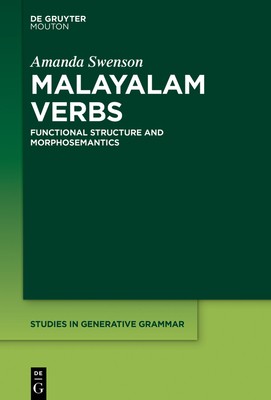
- We will send in 10–14 business days.
- Author: Amanda Swenson
- Publisher: Walter de Gruyter
- ISBN-10: 1501516914
- ISBN-13: 9781501516917
- Format: 16 x 23.4 x 2 cm, hardcover
- Language: English
- SAVE -10% with code: EXTRA
Reviews
Description
This book, using Malayalam as a case study, provides an in-depth exploration of how inflectional suffixes should be separated from the verb and the implications this has for the syntax and semantics. Past work has proposed that Malayalam lacks a Tense Phrase and tense morphology, i.e. is 'tenseless'. However, this book shows that Malayalam behaves differently from other tenseless languages and that it does have tense morphology. It also provides evidence that there is a Tense Phrase in the syntax. In addition, it examines what have been called the two 'imperfectives' and argues that one is a type of progressive, while the other is a pluractional marker and shows that Malayalam lacks perfect morphology and a Perfect Phrase in, minimally, Universal perfects. With respect to finiteness, among other things, it argues that Conjunctive Participles are best analyzed as a type of absolutive adjunct and that -athu 'gerunds' involve nominalization above the Tense Phrase-level. This book will be a valuable resource for anyone interested in cross-linguistic variation in Tense-Aspect-Modality and/or the morphosyntax or morphosemantics of Dravidian languages.
EXTRA 10 % discount with code: EXTRA
The promotion ends in 19d.10:02:08
The discount code is valid when purchasing from 10 €. Discounts do not stack.
- Author: Amanda Swenson
- Publisher: Walter de Gruyter
- ISBN-10: 1501516914
- ISBN-13: 9781501516917
- Format: 16 x 23.4 x 2 cm, hardcover
- Language: English English
This book, using Malayalam as a case study, provides an in-depth exploration of how inflectional suffixes should be separated from the verb and the implications this has for the syntax and semantics. Past work has proposed that Malayalam lacks a Tense Phrase and tense morphology, i.e. is 'tenseless'. However, this book shows that Malayalam behaves differently from other tenseless languages and that it does have tense morphology. It also provides evidence that there is a Tense Phrase in the syntax. In addition, it examines what have been called the two 'imperfectives' and argues that one is a type of progressive, while the other is a pluractional marker and shows that Malayalam lacks perfect morphology and a Perfect Phrase in, minimally, Universal perfects. With respect to finiteness, among other things, it argues that Conjunctive Participles are best analyzed as a type of absolutive adjunct and that -athu 'gerunds' involve nominalization above the Tense Phrase-level. This book will be a valuable resource for anyone interested in cross-linguistic variation in Tense-Aspect-Modality and/or the morphosyntax or morphosemantics of Dravidian languages.


Reviews